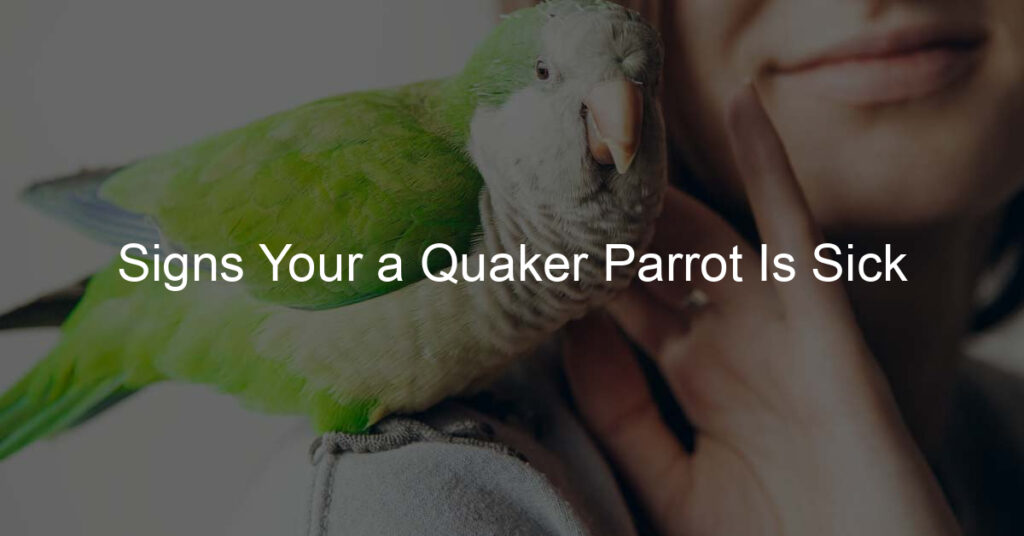As an avid parrot lover, you are likely familiar with the bright and vibrant personality of a Quaker Parrot. They’re known for their ability to mimic words, talk back when you say something, and even learn tricks.
Unfortunately, these little birds can occasionally become ill when they don’t receive proper care or if they come into contact with illness-causing bacteria or viruses.
While it is impossible to anticipate everything that could affect your bird’s health, some telltale signs can help you detect if something isn’t right with your pet Quaker Parrot. Keep reading to find out how to spot indicators of illness in your beloved feathered friend!
1. Changes in behavior such as sleeping more or being less active
2. Eating or drinking less than usual
3. Discharge from the eyes, nose, or beak
4. Unusual feather loss
5. Diarrhea or vomiting
6. Sudden weight loss
What does a sick parrot look like?
A sick parrot will have signs and symptoms that are easily noticeable to the experienced bird owner. They may exhibit changes in behavior or physiology such as lethargy, voice changes, reduced appetite, loss of feathers, and roosting in unusual locations.
As their immune system weakens, they are more likely to suffer from illnesses ranging from bacterial infections to fungal diseases. Other tell-tale signs a parrot might be ill include widening of eyes, change in droppings consistency, sneezing, and nasal discharge. If you think your feathered friend is unwell, it is important to get them to an avian veterinarian for diagnosis and treatment as soon as possible.
What illness do Quaker parrots have?
Quaker parrots, native to South America and Argentina, can be found in captivity around the world. While these birds are known to be healthy and generally hardy, they are also prone to certain illnesses.
Quaker parrots can suffer from respiratory infections if their environment is too drafty or if the air contains any toxins from chemicals, cigarettes, or other pollutants. The key to keeping them healthy is regular cleaning of their cages and having fresh air coming through their cages.
A diet made up of fresh fruits and vegetables should also promote long-term health in Quaker parrots. Additionally, annual vet visits are recommended to detect early signs of disease or illness.
How do you know if a bird is suffering?
Knowing if a bird is suffering can be difficult at times. Often, physical signs of pain or discomfort will appear in the bird’s behavior, such as difficulty flying, exaggerated sleeping patterns, refusal to leave their cage, and so on.
Other subtle signs of distress such as a lack of vocalization or an overall lethargic mentality can also be indicators that something is wrong. It’s important to be vigilant when monitoring a bird for health problems and visit your veterinarian whenever any sign of physical or mental pain is suspected.
How do you treat a sick parrot?
When caring for a sick parrot, the most important thing is to provide it with quality medical care and proper nutrition. It is essential for an owner or veterinarian to assess the bird’s overall health, including body condition and energy levels.
Additionally, it would be beneficial to know the parrot’s environmental history and diet. Knowing what medications and supplements the bird has been taking, as well as its living conditions could all help to assist in properly treating the bird.
Although it can be difficult to watch a pet suffer, filling the parrot’s environment with love and attention will go a long way. Often, Oftentimesmotional comfort can help accelerate recovery from an illness or injury.
Summary
To sum up, Quaker Parrot owners should pay attention to the signs that their feathered friends may be sick. Lethargy, fluffed feathers and chan,ges in vocalizations, droppings, and energy are all signs that your Quaker Parrot may need additional medical care. It’s often helpful to contact a professional avian vet who can diagnose and treat an ill bird as soon as possible.
Additionally, making sure that your pet has access to clean water, healthy food and comfortable living quarters is essential to keep them healthy. Finally, even if there are no symptoms of illness it’s important to get regular check-ups for your pet to make sure they stay healthy for a long time to come.
Caring for a Quaker parrot is an incredibly rewarding experience; being aware of the signs of an illness can ensure that you can give your feathered friend the most enjoyable life possible.








